The European Union has launched the union’s most ambitious clean-fuels scheme yet, pledging $108 billion of funds through the Sustainable Transport Investment Plan to transform the aviation and maritime industries. This master plan aims at the production of sustainable fuels of 20 million tons every year by the year 2035, and it marks the European Union’s most audacious attempt yet at the decarbonization of two of the toughest industries to change.
Massive funding targets a sustainable aviation fuel production breakthrough
The EU investment plan targets sustainable aviation fuels, which currently account for less than 1% of the total aviation fuels used in Europe. The target of the plan is to deploy the production of 13.2 million tons of biofuels and 6.8 million tons of e-fuels every year by the year 2035, which will require unprecedented synchronization of the governments’ and industries’ demand and supply.
Officials of the European Commission estimate that the production of sustainable aviation fuels and e-fuels can yield the creation of tens of thousands of new jobs. These will be generated through the establishment of new production units and the complex management of the sustainable fuels’ supply chains. Economic advantages are also attributable to enhanced investment within regional areas where the feedstock of the biofuels is produced.
Key production targets demonstrate ambitious scope:
- 20 million tonnes of total sustainable fuel production by 2035
- 13.2 million tonnes of biofuels from renewable sources
- 6.8 million tonnes of synthetic e-fuels from green hydrogen
- €100 billion total investment requirement across all sectors
Clean Fuel Regulations trigger a market shift within the transport sector
As of the new EU regulations, such as ReFuel EU Aviation and Fuel EU Maritime, the use of these fuels has been gradually encouraged through the adoption of a minimum of 2% of sustainable fuels for aviation by the year 2025, a cumulative of 6% by the year 2030, and a target of 70% of sustainable fuels for the year 2050. The eSAF Early Movers Coalition is scheduled to be launched towards the end of the year with the help of Member States and is anticipated to unlock a commitment of at least €500 million of synthetic aviation fuel investment.
The European Commission intends to call at least €2.9 billion over the period of 2027 to co-invest with the private sector using the Innovation Fund, Horizon Europe budget, InvestEU, and the European Hydrogen Bank. Invest EU will attract at least €2 billion over the period of 2027 for sustainable fuels alone, while the European Hydrogen Bank has allocated a sum of €300 million for the production of hydrogen aviation and maritime fuels.
Environmental benefits promise substantial emissions reductions
The use of sustainable flight fuels has the potential to reduce the overall emission of CO2 by between 70-90%, depending on the production technology used. The production of e-fuels using green hydrogen and CO2 has the potential to achieve a near-zero emission level, thus marking a revolutionary shift in the field of clean transport technologies. If the European production targets are realised, then the cumulative fuel savings could lead to a reduction of up to 200 million tons of CO2 by the year 2035.
Commissioner for Sustainable Transport and Tourism Apostolos Tzitzikostas spoke of the dual nature of the matter, saying, “Our Sustainable Transport Investment Plan is a decisive step towards a sustainable future. It’s not just about reducing emissions – it’s about creating a stronger, more competitive and resilient Europe that leads the way in sustainable transport.”
The EU’s $108 billion “Clean Fuels Package” is not merely a response to environmental concerns but a much-needed change that catapults the EU to the forefront of sustainable mobility globally. The package aligns regulative and financial measures that work towards a common objective: a low-carbon future for the aviation and maritime sectors. The success of the package will depend on the concerted efforts of Member States and the corporate community that share the commitment to reach a Climate-Neutral future by the year 2050.


